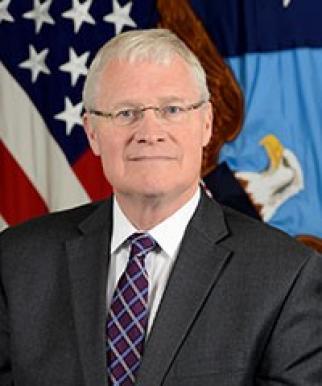Board of Regents Member, Potomac Institute for Policy Studies
 The Honorable Alan R. Shaffer served as the Deputy Under Secretary of Defense for Acquisition and Sustainment (A&S) from January 2019 to January 20, 2021. Senate confirmed in January 2019, he was responsible to the Under Secretary of Defense (A&S) for all matters pertaining to acquisition; contract administration; logistics and materiel readiness; installations and environment; operational energy; chemical, biological, and nuclear weapons; the acquisition workforce; and the defense industrial base.
The Honorable Alan R. Shaffer served as the Deputy Under Secretary of Defense for Acquisition and Sustainment (A&S) from January 2019 to January 20, 2021. Senate confirmed in January 2019, he was responsible to the Under Secretary of Defense (A&S) for all matters pertaining to acquisition; contract administration; logistics and materiel readiness; installations and environment; operational energy; chemical, biological, and nuclear weapons; the acquisition workforce; and the defense industrial base.
From 2015 to 2018, Mr. Shaffer served as the Director, NATO Collaboration Support Office in Neuilly-sur-Seine, France. In this role, he was responsible for coordinating and synchronizing the Science and Technology (S&T) collaboration between NATO member and partner Nations, comprising a network of about 5,000 scientists.
Previous to his role at NATO, Mr. Shaffer served as the Principal Deputy Assistant Secretary of Defense for Research and Engineering (ASD(R&E)) from 2007-2015. In this position, Mr. Shaffer was responsible for formulating, planning and reviewing the DoD Research, Development, Test, and Evaluation (RDT&E) programs, plans, strategy, priorities, and execution of the DoD RDT&E budget that totals roughly $25 billion per year. He also served twice as the Acting Assistant Secretary of Defense for Research and Engineering from 2007-2009 and 2012-2015.
In 2009, he was appointed as the first Director, Operational Energy, Plans and Programs (Acting). Mr. Shaffer has also served as the Executive Director for several senior DoD Task Forces, including review of all research, acquisition, and test activities during the 2005 Base Realignment and Closure. In 2007, he was the Executive Director for the DoD Energy Security Task Force and, and from 2007-2012, he served as the Executive Director of the Mine Resistant Ambush Protection (MRAP) Task Force, where he was responsible for oversight, fielding and employment of 27,000 MRAPs across the Department of Defense.
Before entering the federal government, Mr. Shaffer served 24 years as a commissioned officer in the United States Air Force and retired in the grade of Colonel. While serving, he held positions in command, weather, intelligence, and acquisition oversight with assignments in Utah, California, Ohio, Honduras, Germany, Virginia, and Nebraska.
His military career included deployments to Honduras in the mid-1980s and direct support of the United States Army, 3rd Armored Division in Hanau, Germany. During Operation DESERT STORM, he was responsible for deployment of the 500-person theater weather force and upon retirement from the Air Force in 2000, Mr. Shaffer was appointed to the Senior Executive Service. In 2001, he assumed the position as Director, Plans and Programs, Defense Research and Engineering.
Mr. Shaffer earned a Bachelor of Science in Mathematics from the University of Vermont in 1976, a second Bachelor of Science in Meteorology from the University of Utah, a Master of Science in Meteorology from the Naval Postgraduate School, and a Master of Science in National Resource Strategy from the Industrial College of the Armed Forces. He was awarded the Meritorious Executive Presidential Rank Award in 2004, the Department of Defense Distinguished Civilian Service Award, and the Distinguished Executive Presidential Rank Award in 2007 and 2015.




 Dr. Jennifer Buss serves as the CEO of the Potomac Institute for Policy Studies. The Institute develops meaningful science and technology policy options through discussions and forums and ensure their implementation at the intersection of business and government. She has extensive experience examining policy issues in support of NASA, and has been involved in their strategic planning processes for astronaut medical care and cancer diagnostics and therapeutics. She manages a variety of OSD programs including an outreach effort for the Department of Defense to the start-up community across the country to find innovative technologies to meet the challenges faced by the Services and Government agencies. Dr. Buss performs science and technology trends analysis and recommends policy solutions to some of the country’s most pervasive problems. She has also directed and assisted research on numerous government contracts, including systematic reviews and gap analyses. Dr. Buss is an authority in her scientific field with national recognition in her area of expertise. She is responsible for major projects requiring integration/coordination across multiple scientific disciplines.
Dr. Jennifer Buss serves as the CEO of the Potomac Institute for Policy Studies. The Institute develops meaningful science and technology policy options through discussions and forums and ensure their implementation at the intersection of business and government. She has extensive experience examining policy issues in support of NASA, and has been involved in their strategic planning processes for astronaut medical care and cancer diagnostics and therapeutics. She manages a variety of OSD programs including an outreach effort for the Department of Defense to the start-up community across the country to find innovative technologies to meet the challenges faced by the Services and Government agencies. Dr. Buss performs science and technology trends analysis and recommends policy solutions to some of the country’s most pervasive problems. She has also directed and assisted research on numerous government contracts, including systematic reviews and gap analyses. Dr. Buss is an authority in her scientific field with national recognition in her area of expertise. She is responsible for major projects requiring integration/coordination across multiple scientific disciplines. Dr. Timothy Bumpus received his PhD in chemical biology from Cornell University where, as a National Science Foundation Graduate Research Fellow, he designed and implemented new chemical tools to study lipid centric cell signaling processes. Prior to Cornell, Dr. Bumpus attended Luther College where he received his B.A., majoring in chemistry, biology, and mathematics. He now brings his diverse scientific expertise to bear on the many, varied science and technology policy issues facing the country as part of the Potomac Institute for Policy Studies’ research staff.
Dr. Timothy Bumpus received his PhD in chemical biology from Cornell University where, as a National Science Foundation Graduate Research Fellow, he designed and implemented new chemical tools to study lipid centric cell signaling processes. Prior to Cornell, Dr. Bumpus attended Luther College where he received his B.A., majoring in chemistry, biology, and mathematics. He now brings his diverse scientific expertise to bear on the many, varied science and technology policy issues facing the country as part of the Potomac Institute for Policy Studies’ research staff. The Honorable Alan R. Shaffer served as the Deputy Under Secretary of Defense for Acquisition and Sustainment (A&S) from January 2019 to January 20, 2021. Senate confirmed in January 2019, he was responsible to the Under Secretary of Defense (A&S) for all matters pertaining to acquisition; contract administration; logistics and materiel readiness; installations and environment; operational energy; chemical, biological, and nuclear weapons; the acquisition workforce; and the defense industrial base.
The Honorable Alan R. Shaffer served as the Deputy Under Secretary of Defense for Acquisition and Sustainment (A&S) from January 2019 to January 20, 2021. Senate confirmed in January 2019, he was responsible to the Under Secretary of Defense (A&S) for all matters pertaining to acquisition; contract administration; logistics and materiel readiness; installations and environment; operational energy; chemical, biological, and nuclear weapons; the acquisition workforce; and the defense industrial base.